- Home
- John Scalzi
Zoe's Tale Page 5
Zoe's Tale Read online
Page 5
“What?” I said.
“John,” Mom said, from her chair, where she had been reading.
“Never mind those last two,” Dad said. “But you will have to give him a name.”
I held the puppy at arm’s length to get a good look at him; he continued to try to lick my face from a distance and wobbled in my grip as his tail’s momentum moved him around. “What are some good dog names?” I asked.
“Spot. Rex. Fido. Champ,” Dad said. “Those are the cliché names, anyway. Usually people try to go for something more memorable. When I was a kid I had a dog my dad called Shiva, Destroyer of Shoes. But I don’t think that would be appropriate in a community of former Indians. Maybe something else.” He pointed to my elephant pendant. “I notice you seem to be into elephants these days. You have a Celeste. Why not call him Babar?”
From behind Dad I could see Jane look up from her reading to look at me, remembering what happened at the toy store, waiting to see how I would react.
I burst out laughing.
“So that’s a yes,” Dad said, after a minute.
“I like it,” I said. I hugged my new puppy, and then held him out again.
“Hello, Babar,” I said.
Babar gave a happy little bark and then peed all over my shirt.
And that’s the story of the jade elephant.
FIVE
There was a tap on my door, a rat-a-tat that I gave Hickory to use when I was nine, when I made it a secret member of my secret club. I made Dickory a secret member of an entirely different secret club. Same with Mom, Dad and Babar. I was all about the secret clubs when I was nine, apparently. I couldn’t even tell you what the name of that secret club was now. But Hickory still used the knock whenever my bedroom door was closed.
“Come in,” I said. I was standing by my bedroom window.
Hickory came in. “It’s dark in here,” it said.
“That’s what happens when it’s late and the lights are out,” I said.
“I heard you walking about,” Hickory said. “I came to see if you needed anything.”
“Like a warm glass of milk?” I said. “I’m fine, Hickory. Thank you.”
“Then I’ll leave you,” Hickory said, backing out.
“No,” I said. “Come here a minute. Look.”
Hickory walked over to stand next to me at the window. He looked where I pointed, to two figures in the road in front of our house. Mom and Dad. “She has been out there for some time,” Hickory said. “Major Perry joined her a few minutes ago.”
“I know,” I said. “I saw him walk out.” I heard her walk out, too, about an hour earlier; the squeaking of the springs on the screen door had gotten me out of bed. I hadn’t been sleeping, anyway. Thinking about leaving Huckleberry and colonizing somewhere new was keeping my brain up, and then made me pace around. The idea of leaving was sinking in. It was making me twitchier than I thought it would.
“You know about the new colony?” I asked Hickory.
“We do,” Hickory said. “Lieutenant Sagan informed us earlier this evening. Dickory also filed a request to our government for more information.”
“Why do you call them by their rank?” I asked Hickory. My brain was looking for tangents at the moment, it seemed, and this was a good one. “Mom and Dad. Why don’t you call them ‘Jane’ and ‘John’ like everyone else?”
“It’s not appropriate,” Hickory said. “It’s too familiar.”
“You’ve lived with us for seven years,” I said. “You might be able to risk a little familiarity.”
“If you wish us to call them ‘John’ and ‘Jane,’ then we will do so,” Hickory said.
“Call them what you want,” I said. “I’m just saying that if you want to call them by their first names, you could.”
“We will remember that,” Hickory said. I doubted there would be a change in protocol anytime soon.
“You’ll be coming with us, right?” I asked, changing the subject. “To the new colony.” I hadn’t assumed that Hickory and Dickory would not be joining us, which when I thought about it might not have been a smart assumption.
“Our treaty allows it,” Hickory said. “It will be up to you to decide.”
“Well, of course I want you to come,” I said. “We’d just as soon leave Babar behind than not take you two.”
“I am happy to be in the same category as your dog,” Hickory said.
“I think that came out wrong,” I said.
Hickory held up a hand. “No,” it said. “I know you did not mean to imply Dickory and I are like pets. You meant to imply Babar is part of your household. You would not leave without him.”
“He’s not just part of the household,” I said. “He’s family. Slobbery, sort of dim family. But family. You’re family, too. Weird, alien, occasionally obtrusive family. But family.”
“Thank you, Zoë,” Hickory said.
“You’re welcome,” I said, and suddenly felt shy. Conversations with Hickory were going weird places today. “That’s why I asked about you calling my parents by rank, you know. It’s not a usual family thing.”
“If we are truly part of your family, then it is safe to say it’s not a usual family,” Hickory said. “So it would be hard to say what would be usual for us.”
This got a snort from me. “Well, that’s true,” I said. I thought for a moment. “What is your name, Hickory?” I asked.
“Hickory,” it said.
“No, I mean, what was your name before you came to live with us,” I said. “You had to have been named something before I named you Hickory. And Dickory, too, before I named it that.”
“No,” it said. “You forget. Before your biological father, Obin did not have consciousness. We did not have a sense of self, or the need to describe ourselves to ourselves or to others.”
“That would make it hard to do anything with more than two of you,” I said. “Saying ‘hey, you’ only goes so far.”
“We had descriptors, to help us in our work,” Hickory said. “They were not the same as names. When you named Dickory and me, you gave us our true names. We became the first Obin to have names at all.”
“I wish I had known that at the time,” I said, after I took this in. “I would have given you names that weren’t from a nursery rhyme.”
“I like my name,” Hickory said. “It’s popular among other Obin as well. ‘Hickory’ and ‘Dickory’ both.”
“There are other Obin Hickorys,” I said.
“Oh, yes,” Hickory said. “Several million, now.”
I had no possible intelligible response to that. I turned my attention back to my parents, who were still standing in the road, entwined.
“They love each other,” Hickory said, following my gaze.
I glanced back at it. “Not really where I was expecting the conversation to go, but okay,” I said.
“It makes a difference,” Hickory said. “In how they speak to each other. How they communicate with each other.”
“I suppose it does,” I said. Hickory’s observation was an understatement, actually. John and Jane didn’t just love each other. The two of them were nuts for each other, in exactly the sort of way that’s both touching and embarrassing to a teenage daughter. Touching because who doesn’t want their parents to love each other, right down to their toes? Embarrassing because, well. Parents. Not supposed to act like goofs about each other.
They showed it in different ways. Dad was the most obvious about it, but I think Mom felt it more intensely than he did. Dad was married before; his first wife died back on Earth. Some part of his heart was still with her. No one else had any claim on Jane’s heart, though. John had all of it, or all of it that was supposed to belong to your spouse. No matter how you sliced it, though, there’s nothing either of them wouldn’t do for each other.
“That’s why they’re out here,” I said to Hickory. “In the road right now, I mean. Because they love each other.”
“How so?” Hickory aske
d.
“You said it yourself,” I said. “It makes a difference in how they communicate.” I pointed again to the two of them. “Dad wants to go and lead this colony,” I said. “If he didn’t, he would have just said no. It’s how he works. He’s been moody and out of sorts all day because he wants it and he knows there are complications. Because Jane loves it here.”
“More than you or Major Perry,” Hickory said.
“Oh, yeah,” I said. “It’s where she’s been married. It’s where she’s had a family. Huckleberry is her homeworld. He’d say no if she doesn’t give him permission to say yes. So that’s what she’s doing, out there.”
Hickory peered out again at the silhouettes of my parents. “She could have said so in the house,” it said.
I shook my head. “No,” I said. “Look how she’s looking up. Before Dad came out, she was doing the same thing. Standing there and looking up at the stars. Looking for the star our new planet orbits, maybe. But what she’s really doing is saying good-bye to Huckleberry. Dad needs to see her do it. Mom knows that. It’s part of the reason she’s out there. To let him know she’s ready to let this planet go. She’s ready to let it go because he’s ready to let it go.”
“You said it was part of the reason she’s out there,” Hickory said. “What’s the other part?”
“The other part?” I asked. Hickory nodded. “Oh. Well. She needs to say good-bye for herself, too. She’s not just doing it for Dad.” I watched Jane. “A lot of who she is, she became here. And we may never get back here. It’s hard to leave your home. Hard for her. I think she’s trying to find a way to let it go. And that starts by saying good-bye to it.”
“And you?” Hickory said. “Do you need to say good-bye?”
I thought about it for a minute. “I don’t know,” I admitted. “It’s funny. I’ve already lived on four planets. Well, three planets and a space station. I’ve been here longest, so I guess it’s my home more than any of the rest of them. I know I’ll miss some of the things about it. I know I’ll miss some of my friends. But more than any of that… I’m excited. I want to do this. Colonize a new world. I want to go. I’m excited and nervous and a little scared. You know?”
Hickory didn’t say anything to this. Outside the window, Mom had walked away a little from Dad, and he was turning to head back into the house. Then he stopped and turned back to Mom. She held out her hand to him. He came to her, took it. They began to walk down the road together.
“Good-bye, Huckleberry,” I said, whispering the words. I turned away from the window and let my parents have their walk.
SIX
“I don’t know how you could possibly be bored,” Savitri said to me, leaning on an observation deck rail as we looked out from Phoenix Station to the Magellan. “This place is great.”
I looked over at her with mock suspicion. “Who are you, and what have you done with Savitri Guntupalli?”
“I don’t know what you mean,” Savitri said, blandly.
“The Savitri I know was sarcastic and bitter,” I said. “You are all gushy, like a schoolgirl. Therefore: You’re not Savitri. You are some horrible spunky camouflaged alien thing, and I hate you.”
“Point of order,” Savitri said. “You’re a schoolgirl, and you hardly ever gush. I’ve known you for years and I don’t believe I have ever seen you involved in a gushing incident. You are almost entirely gush-free.”
“Fine, you gush even more than a schoolgirl,” I said. “Which just makes it worse. I hope you’re happy.”
“I am,” Savitri said. “Thank you for noticing.”
“Hrrrumph,” I said, rolled my eyes for extra effect, and applied myself to the observation deck rail with renewed moodiness.
I was not actually irritated with Savitri. She had an excellent reason to be excited; all her life she’d been on Huckleberry and now, finally, she was somewhere else: on Phoenix Station, the space station, the largest single thing humans had ever built, hovering above Phoenix, the home planet of the entire Colonial Union. For as long as I had known her—which was for as long as she had been my dad’s assistant, back in New Goa, on Huckleberry—Savitri had cultivated an air of general smart-assery, which is one reason I adored her and looked up to her. One has to have role models, you know.
But after we had lifted from Huckleberry her excitement from finally getting to see more of the universe had gotten to her. She’d been unguardedly excited about everything; she even got up early to watch the Magellan, the ship that would take us to Roanoke, dock with Phoenix Station. I was happy for her that she was so excited about everything, and I mocked her mercilessly for it every chance I got. One day, yes, there would be payback—Savitri taught me much of what I know about being a smartass, but not everything she knew about it—but until then it was one of the few things keeping me entertained.
Listen: Phoenix Station is huge, it’s busy, and unless you have an actual job—or like Savitri are just in from the sticks—there is nothing going on. It’s not an amusement park, it’s just a big dull combination of government offices, docks and military headquarters, all jammed into space. If it weren’t for the fact that stepping outside to get some fresh air would kill you—no fresh air, just lung-popping vacuum—it could be any big, faceless, dead-boring civic center anywhere humans come together to do big, faceless, dead-boring civic things. It is not designed for fun, or at least any sort of fun I was interested in having. I suppose I could have filed something. That would have been a kick.
Savitri, in addition to being insensibly excited not to be on Huckleberry, was also being worked like a dog by John and Jane: The three of them had spent nearly all their time since we arrived at Phoenix Station getting up to speed on Roanoke, learning about the colonists who would be with us, and overseeing the loading of supplies and equipment onto the Magellan. This didn’t come as news to me, but it did leave me with not a whole lot to do, and no one much to do it with. I couldn’t even do much with Hickory, Dickory, or Babar; Dad told Hickory and Dickory to lay low while we were on Phoenix Station, and dogs weren’t really allowed the run of the station. We had to lay out paper towels for Babar to do his thing on. The first night I did this and tried to get him to take care of business, he gave me a look that said you have got to be kidding. Sorry, buddy. Now pee, damn it.
The only reason I was getting some time with Savitri at all was that through a clever combination of whining and guilt I had convinced her to take her lunch break with me. Even then she had brought her PDA and spent half of lunch going over manifests. She was even excited about that. I told her I thought she might be ill.
“I’m sorry you’re bored,” Savitri said, back in the present. “You might want to hint to your parents.”
“Trust me, I did,” I said. “Dad actually stepped up, too. He said he’s going to take me down to Phoenix. Do some last-minute shopping and other things.” The other things were the main reason for us to go, but I didn’t want to bring them up to Savitri; I was moody enough as it was.
“You haven’t come across any other colonists your own age yet?” Savitri asked.
I shrugged. “I’ve seen some of them.”
“But you haven’t spoken to any of them,” Savitri said.
“Not really,” I said.
“Because you’re shy,” Savitri said.
“Now your sarcasm comes back,” I said.
“I’m sympathetic to your boredom,” Savitri said. “But less so if you’re just marinating in it.” She looked around at the observation desk, which had a few other people in it, sitting or reading or staring out at the ships docked at the station. “What about her?” she said, pointing to a girl who looked about my age, who was looking out the deck window.
I glanced over. “What about her?” I said.
“She looks about as bored as you,” Savitri said.
“Appearances can be deceiving,” I said.
“Let’s check,” Savitri said, and before I could stop her called to the other girl. “Hey,”
Savitri said.
“Yes?” the girl said.
“My friend here thinks she’s the most bored teenage girl on the entire station,” Savitri said, pointing at me. I had nowhere to cringe. “I was wondering if you had anything to say about that.”
“Well,” the girl said, after a minute. “I don’t want to brag, but the quality of my boredom is outstanding.”
“Oh, I like her,” Savitri said to me, and then waved the girl over. “This is Zoë,” she said, introducing me.
“I can talk,” I said to Savitri.
“Gretchen,” she said, extending her hand to me.
“Hello,” I said, taking it.
“I’m interested in your boredom and would like to hear more,” Gretchen said.
Okay, I thought. I like her too.
Savitri smiled. “Well, since you two seem to be equally matched, I have to go,” she said. “There are containers of soil conditioners that need my attention.” She gave me a peck, waved to Gretchen, and left.
“Soil conditioners?” Gretchen said to me, after she had gone.
“It’s a long story,” I said.
“I’ve got nothing but time,” Gretchen said.
“Savitri is the assistant to my parents, who are heading up a new colony,” I said, and pointed to the Magellan. “That’s the ship we’re going on. One of Savitri’s jobs is to make sure that everything that’s on the manifest list actually gets put on the ship. I guess she’s up to soil conditioners.”
“Your parents are John Perry and Jane Sagan,” Gretchen said.
I stared at her for a minute. “Yeah,” I said. “How do you know?”
“Because my dad talks about them a lot,” she said, and motioned toward the Magellan. “This colony your parents are leading? It was his idea. He was Erie’s representative on the CU legislature, and for years he argued that people from established colonies should be able to colonize, not just people from Earth. Finally the Department of Colonization agreed with him—and then it gave the leadership of the colony to your parents instead of him. They told my dad it was a political compromise.”

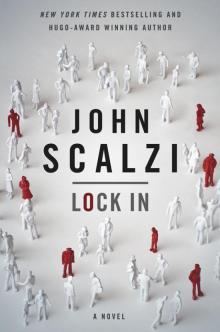 Lock In
Lock In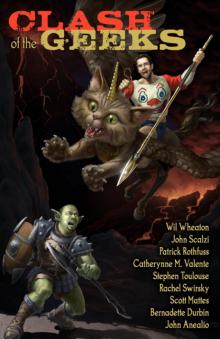 Clash of the Geeks
Clash of the Geeks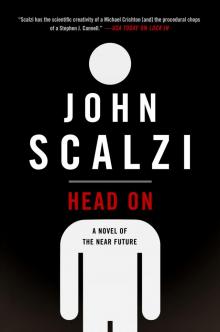 Head On
Head On The Dog King
The Dog King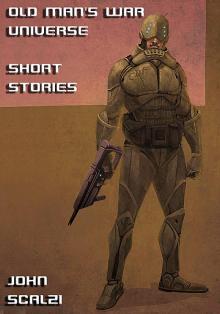 Old Man's War Universe: Short Stories
Old Man's War Universe: Short Stories The End of All Things
The End of All Things Tales From the Clarke
Tales From the Clarke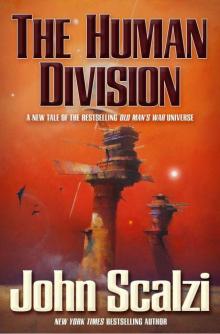 The Human Division
The Human Division The Android's Dream
The Android's Dream An Election
An Election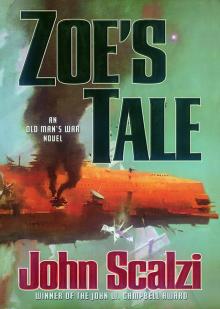 Zoe's Tale
Zoe's Tale Agent to the Stars
Agent to the Stars This Hollow Union
This Hollow Union The Gentle Art of Cracking Heads
The Gentle Art of Cracking Heads Old Man's War
Old Man's War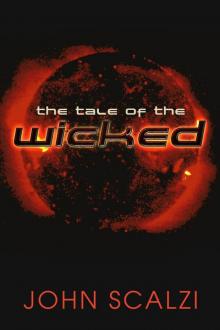 The Tale of the Wicked
The Tale of the Wicked Your Hate Mail Will Be Graded: A Decade of Whatever, 1998-2008
Your Hate Mail Will Be Graded: A Decade of Whatever, 1998-2008 Judge Sn Goes Golfing
Judge Sn Goes Golfing The Back Channel
The Back Channel The Human Division 0.5 - After the Coup
The Human Division 0.5 - After the Coup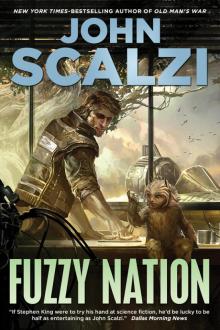 Fuzzy Nation
Fuzzy Nation The Observers
The Observers This Must Be the Place
This Must Be the Place The Last Colony
The Last Colony Unlocked: An Oral History of Haden's Syndrome
Unlocked: An Oral History of Haden's Syndrome A Voice in the Wilderness
A Voice in the Wilderness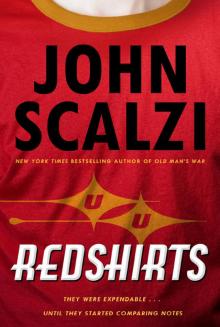 Redshirts
Redshirts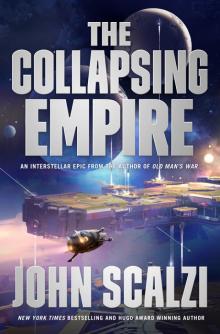 The Collapsing Empire
The Collapsing Empire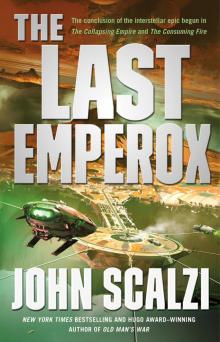 The Last Emperox
The Last Emperox The God Engines
The God Engines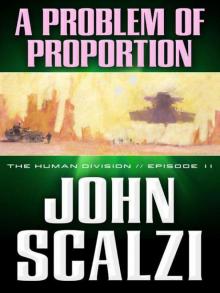 A Problem of Proportion
A Problem of Proportion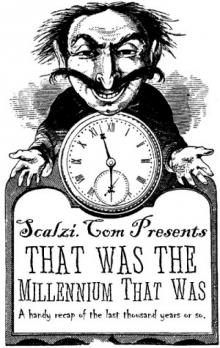 THAT WAS THE MILLENIUM THAT WAS
THAT WAS THE MILLENIUM THAT WAS The B-Team
The B-Team The Sound of Rebellion
The Sound of Rebellion The President's Brain Is Missing
The President's Brain Is Missing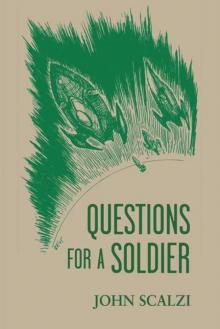 Questions for a Soldier
Questions for a Soldier Walk the Plank
Walk the Plank We Only Need the Heads
We Only Need the Heads How I Proposed to My Wife: An Alien Sex Story
How I Proposed to My Wife: An Alien Sex Story Earth Below, Sky Above
Earth Below, Sky Above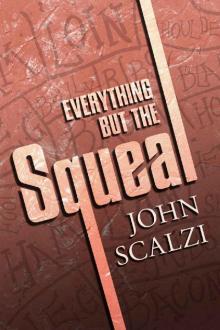 Everything but the Squeal
Everything but the Squeal Old Man’s War
Old Man’s War The Human Division #12: The Gentle Art of Cracking Heads
The Human Division #12: The Gentle Art of Cracking Heads This Must Be the Place thd-10
This Must Be the Place thd-10 A Voice in the Wilderness thd-4
A Voice in the Wilderness thd-4 The Observers thd-9
The Observers thd-9 The End of All Things: The Fourth Instalment
The End of All Things: The Fourth Instalment Earth Below, Sky Above thd-13
Earth Below, Sky Above thd-13 Zoe`s Tale вбиос-4
Zoe`s Tale вбиос-4 After the Coup
After the Coup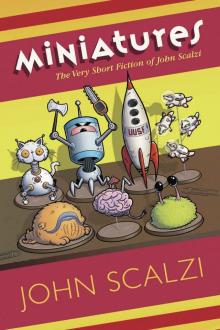 Miniatures: The Very Short Fiction of John Scalzi
Miniatures: The Very Short Fiction of John Scalzi The Last Colony вбиос-3
The Last Colony вбиос-3 Tales From the Clarke thd-5
Tales From the Clarke thd-5 Old Man's War omw-1
Old Man's War omw-1 The Human Division #8: The Sound of Rebellion
The Human Division #8: The Sound of Rebellion The Ghost Brigades omw-2
The Ghost Brigades omw-2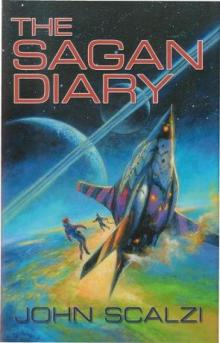 The Sagan Diary (old man's war)
The Sagan Diary (old man's war) The Sound of Rebellion thd-8
The Sound of Rebellion thd-8 The Human Division 13 - Earth Below, Sky Above
The Human Division 13 - Earth Below, Sky Above Head On_A Novel of the Near Future
Head On_A Novel of the Near Future The End of All Things: The First Instalment
The End of All Things: The First Instalment The B-Team thd-1
The B-Team thd-1 The Back Channel thd-6
The Back Channel thd-6 Walk the Plank thd-2
Walk the Plank thd-2 The Human Division #9: The Observers
The Human Division #9: The Observers The End of All Things: The Third Instalment
The End of All Things: The Third Instalment The Human Division #10: This Must Be the Place
The Human Division #10: This Must Be the Place The End of All Things #2: This Hollow Union
The End of All Things #2: This Hollow Union We Only Need the Heads thd-3
We Only Need the Heads thd-3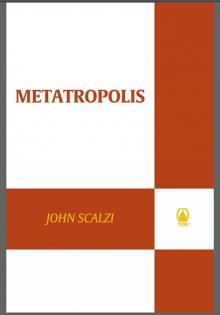 Metatropolis
Metatropolis The Dog King thd-7
The Dog King thd-7 The Consuming Fire (The Interdependency)
The Consuming Fire (The Interdependency)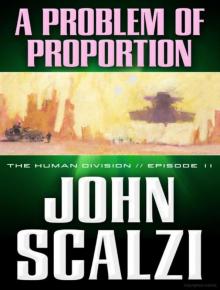 The Human Division #11: A Problem of Proportion
The Human Division #11: A Problem of Proportion